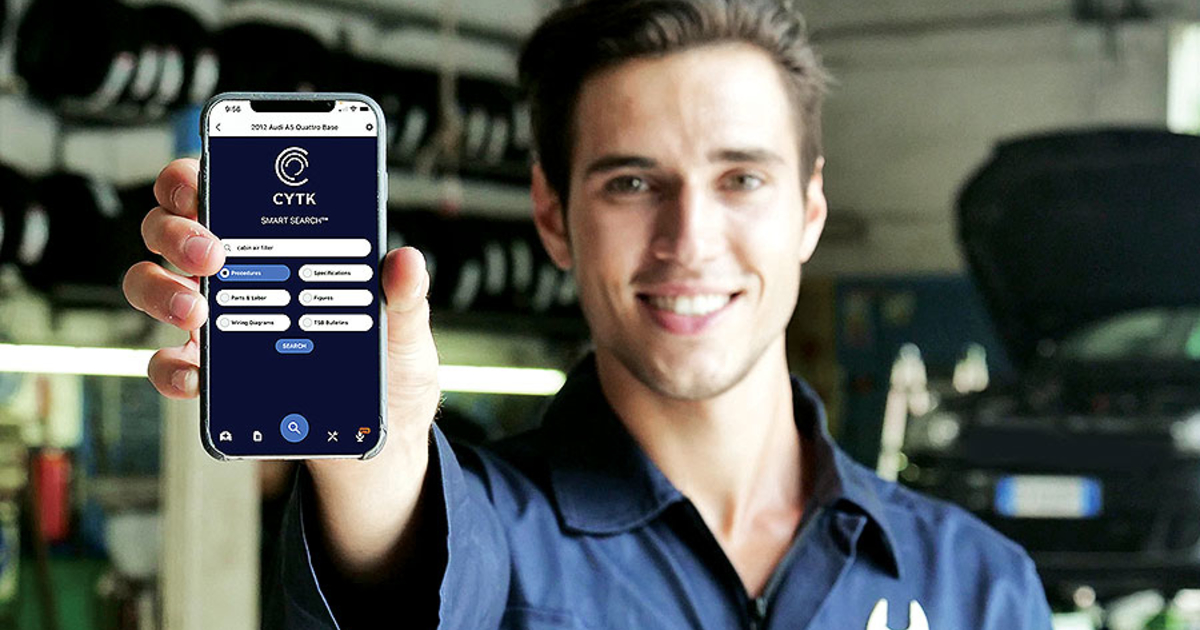
Software developer Bryan Levenson worked for more than 20 years in Silicon Valley before setting his sights on Detroit and the auto industry.
In meetings with manufacturers, he learned how work stalled when dealership service department technicians had to put down their tools to find a computer to research vehicle parts or repair information.
Levenson saw an opportunity to supply both experienced technicians and a new generation of digital-savvy ones with a tool that would give them comprehensive information to fix vehicles.
“We discovered the great inefficiencies that happen when a tech puts down his or her tools and moves away from the vehicle,” he said. “There may be one computer workstation in the shop, the printer may be out of paper, or there were typing mistakes when entering VIN information. We felt that if we could enable techs with accurate information that would not result in their moving away from the vehicle, we could increase repair and service efficiency.”
Levenson, who built a cloud system for Twitter and developed machine learning for Rolls-Royce’s jet engines division, went back to Silicon Valley and developed CYTK, an artificial intelligence mobile application for the auto repair and maintenance service industry.
The app enables techs to use machine learning and natural language understanding to perform their work with a higher degree of accuracy by accessing manufacturer information on the vehicle they are getting ready to service. The information is available in a smartphone app on either iOS or Android devices. It was tested beginning in the fourth quarter of 2021 and was ready for use in March.
So far, CYTK has more than 30 subscribers, and another 30 or so are signing up weekly for a free, 30-day trial — all done, Levenson notes, with no marketing budget and one sales director.
“It’s difficult to get dealership folks to try something new,” Levenson said. “Our app is a brand-new business model that’s never been tried before.”
The target market is dealership techs, especially those in operations with express oil change and light repair services. Techs at used-vehicle lots, franchise service centers such as Pep Boys and independent shops also are potential customers.
About 40 percent of CYTK’s subscribers are mobile techs, while the rest is split evenly between dealerships and independent and aftermarket shops.
Levenson said every manufacturer must publish data on repairs, procedures and parts each month. This began in 1992, and today 35-plus brands contribute data monthly. It is purchased by Motor, a subsidiary of Hearst publishing. CYTK acquires the information to update its app from Motor.
Bozard Ford Quick Lane in St. Augustine, Fla., was an early adopter of CYTK after participating in a company case study.
“We were a pilot store with access to the app before it was launched,” said Russell Wright, career development specialist and technical trainer at Bozard Ford. “We saw the immediate benefit, especially with non-Ford and import manufacturer [vehicles] that come in for an oil change.”
Wright said his techs simply use their smartphones to scan the VIN from the repair order. At that point, the tech knows exactly, for example, how to reset the oil light; how much oil is needed for the oil change; and the weight of the oil without having to look up information on a computer at one of the two workstations in the 12-bay shop.
Wright said he receives a monthly utilization report on the CYTK app and uses that to counsel techs who are not using the app, showing them how it helps save time and increase efficiency.
“The newer guys embrace the CYTK app,” he said.
“We do about 1,600 vehicles a month, and using the app has reduced our typical time spent servicing a vehicle by two and a half minutes, or roughly 20 percent.”
Levenson said his company will generate revenue through recurring monthly subscriptions. The cost of the app is approximately $60 a month for independent shop techs and from $100 to $179 monthly per dealership.
CYTK has fewer than 10 engineers and programmers working out of Silicon Valley, Detroit and South America and wants to ramp up to 15 employees.
Levenson believes his app will help not only the recruitment and education of techs but also the expansion of mobile services where cars are worked on at customers’ homes. He said CYTK would also get a shot in the arm with the growth of electric vehicle sales and the amount of information stored in EVs.
Larry Hourcle, an NADA Academy instructor, says that CYTK is an interesting product and inexpensive to use.
“It gives techs a phenomenal asset to help them find ways to diagnose and repair,” Hourcle said. “The links to YouTube videos plus the information on the app give techs written and video instructions on their phones.”
He said entry-level techs need information quickly. Plus, CYTK would be especially helpful for mom and pop operations that may have only a handful of techs and don’t have the knowledge base gained from years of experience.
“Lots of manufacturers have quick oil change services, and having the app helps techs shave minutes off of service time, especially if they discover they need to replace a headlight bulb during the oil change,” Hourcle said.
“The new generation of techs need mentors, and this app can serve as a repair plus estimating tool when building an estimate. It will also help to elevate repair quality.”